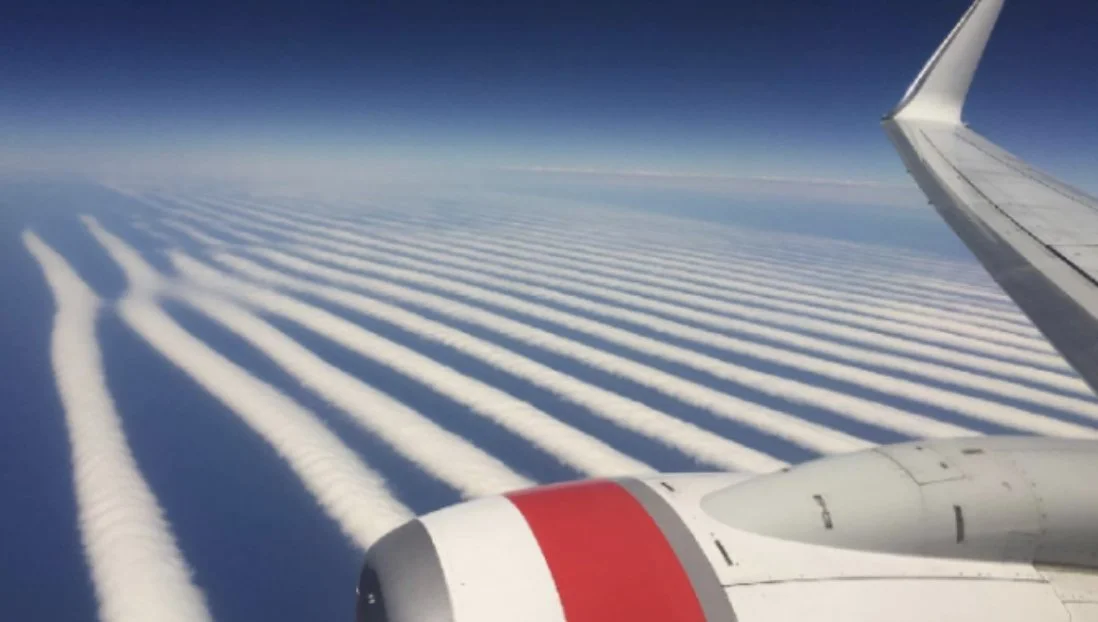Mexico Bans Chemtrails and Geoengineering After Attempt To Dim The Sun
(Baxter Dmitry) Mexico has cracked down on chemtrails and experiments in solar geoengineering after a rogue startup company attempted to dim the sun to fight climate change.
The controversial proposed climate solution, in which aerosol particles are released into the upper atmosphere to reflect the Sun’s heat, will no longer be allowed to take place in the country, the Mexican Ministry of Environment and Natural Resources (Semarnat) announced last week.
This is an interesting development because until recently the official narrative claimed that chemtrails and other forms of geoengineering were “conspiracy theories.” Chalk this one up as another victory for so-called conspiracy theorists.
In Mexico, both large-scale and in-development projects involving solar engineering are to be halted, via coordination between the Mexican environment ministry and the country’s National Council of Science and Technology, the news statement noted. The goal of the new policy is to “protect communities and environments.”
Gizmodo reports: The nationwide ban comes on the heels of climate tech startup Make Sunsets’ claims that it released weather balloons filled with sulfur dioxide particles from an unspecified location in the Mexican state of Baja California Sur—without any sort of permission, dialogue, or approval from any Mexican regulatory agency or authority. The startup’s co-founder, Luke Iseman (formerly of Y Combinator and numerous other startups that seem to have floundered or been abandoned), said in a December interview with MIT Technology Review that he’d conducted two test balloon launches there in April 2022.
But Iseman has contradicted his own claims since then. In a follow-up report from The Wall Street Journal, published Thursday, Iseman changed his story to “a single weather balloon.” And in a Wednesday blogpost from Make Sunsets, the company floated the possibility that it never actually released any sulfur balloons at all. “Make Sunsets will share all information about its activities in Mexico to date (if any) with… responsible agencies,” the startup wrote. “Make sunsets will cease its operations in Mexico (if there were any),” the post continues.
Regardless of whether or not Iseman and Make Sunsets actually did what they claimed, the alleged stunt drew widespread criticism and concern from scientists and policy experts alike. Though solar geoengineering is a simple enough concept, safe implementation of the theoretical climate change remedy is a complex issue.
Blocking out sunlight via sulfur particles could trigger rapid and significant global shifts in precipitation that could leave some parts of the planet flooded and others arid, according to past research. If not managed properly, solar geoengineering could lead to even more erratic and rapid changes in temperature than we’re currently experiencing under climate change. And the use of sulfur, specifically, would likely damage Earth’s crucial ozone layer.
Then, there’s the geopolitical implications of a country or rogue actor deciding to go ahead and change the stratosphere’s composition without international buy-in.
For all of these reasons and more, it’s probably not in Mexico’s favor to allow this sort of unregulated geoengineering experimentation on its soil. The ministry’s press statement cites a United Nations moratorium on geoengineering that Mexico and nearly 200 other countries (though not the U.S.) agreed to in 2010—as well as the risk of dangerous climactic consequences. “There are enough studies that show that there would be negative and unequal impacts associated with the release of these aerosols,” wrote the environment ministry.
All that said, Iseman’s experiment (if it happened) probably wasn’t enough to impact much of anything. From a scientific perspective, it wasn’t even much of an experiment. The Make Sunsets founder previously told MIT Tech Review that he doesn’t know if the balloons released made it high enough in the atmosphere to distribute their sulfur in the correct place. And Harvard geoengineering researcher David Keith said that such a small amount of particles would likely have no effect on the climate.
Iseman is reportedly disappointed by Mexico’s decision. “I expected and hoped for dialogue,” he told the Wall Street Journal. “I’m surprised by the speed and scope of the response,” he added. Prior to the ban, Make Sunsets indicated it planned to fly three more balloons from Southern Baja this month. Now, that presumably won’t happen. But the perpetual founder isn’t giving up. “One of my dreams is that we could, in some distant future, grow Make Sunsets legally and responsibility,” he said to the WSJ.
And maybe Iseman would have better luck back in the U.S., which hasn’t co-signed any pesky UN agreements to not block out the Sun. In 2022, the Biden Administration announced it’s developing a five-year plan for geoengineering research. If the ~$750,000 in venture capital money that Make Sunsets raised isn’t enough, perhaps in the near future, the company could apply for some federal funding.




